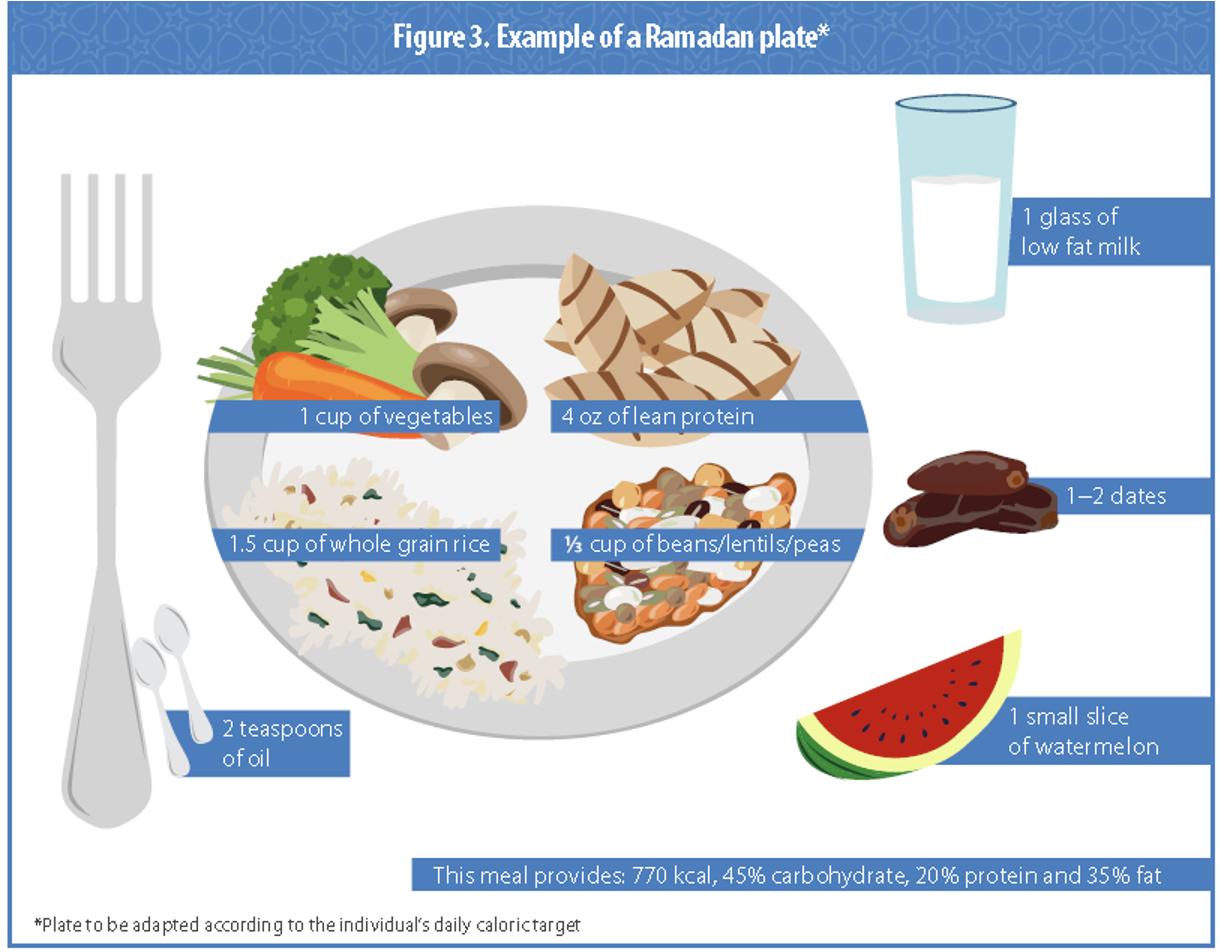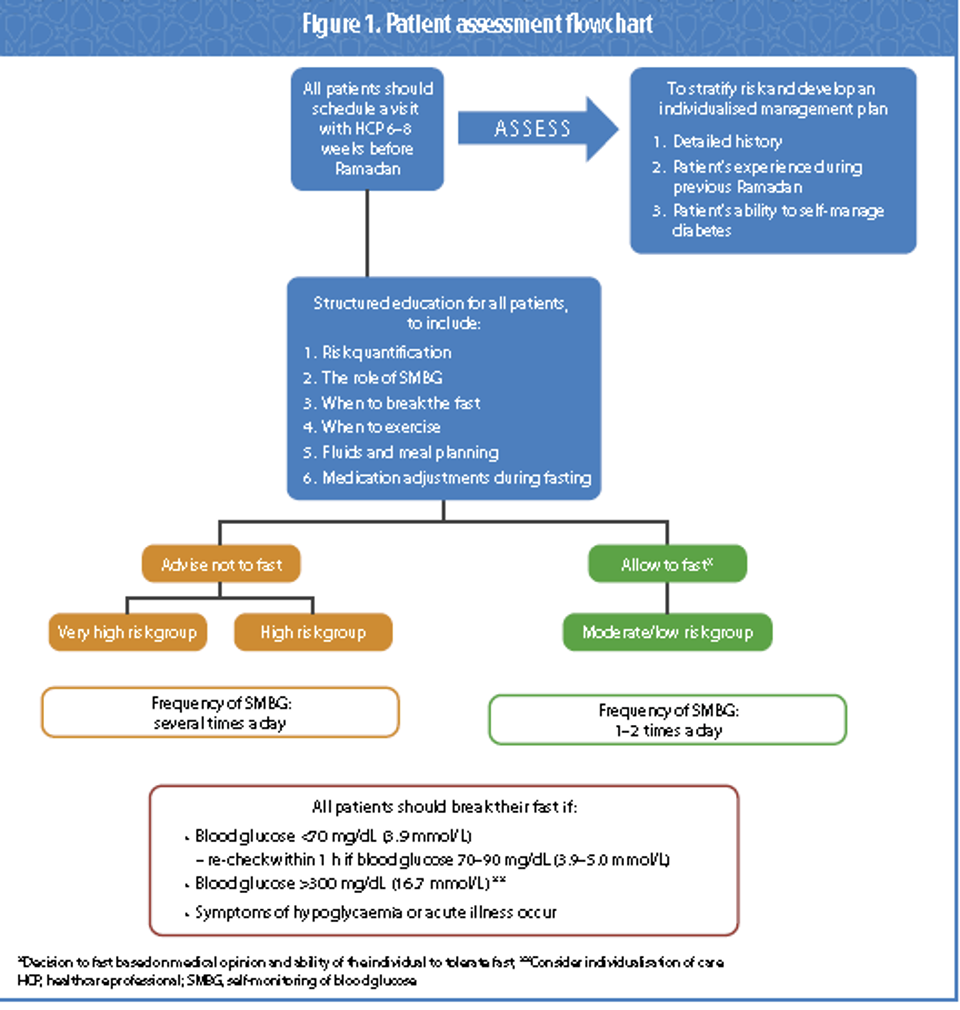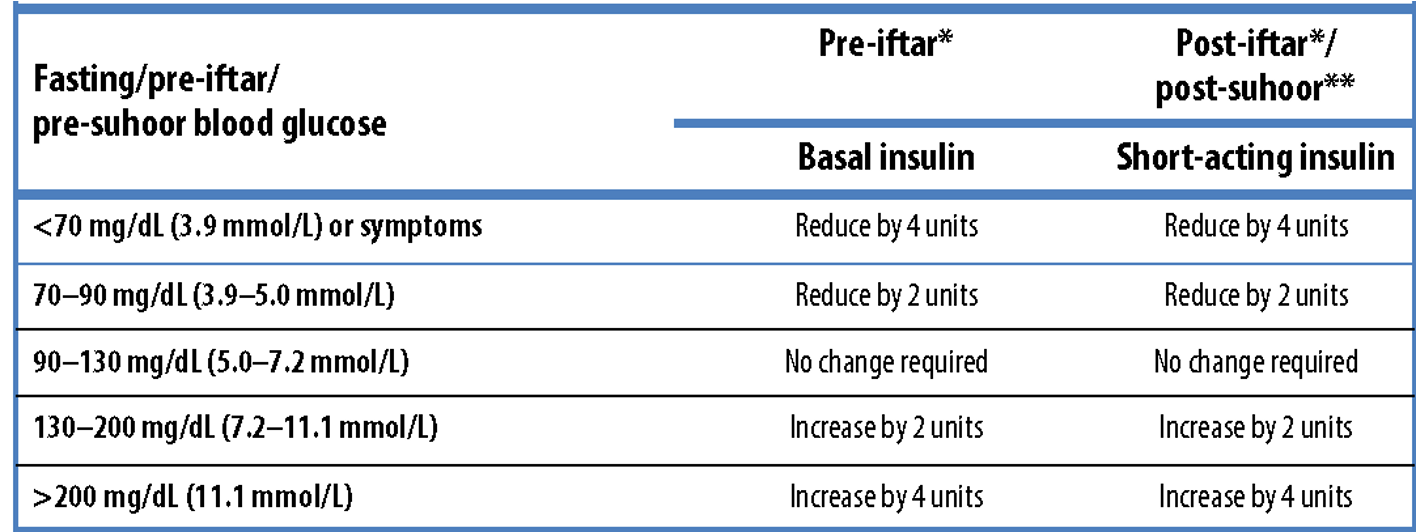-
Credits
- Section Writer: Dr. Om J Lakhani
- Section Editor: Dr. Om J Lakhani
-
**Fasting regulations during Ramadan **
-
Q. How long is the fast period during Ramandan ?
- About 1 month
-
Q. What are the restriction suggested ?
- Avoid eating, oral medication, drinking, smoking, and sexual activity from dawn to sunset
-
Q. Who is exempted?
- Elderly
- Children
- Pregnant women
- Pregnant women are told to fast for a similar period after delivery
- Those who cannot fast are asked to donate to the poor for every day of missed fast
-
Q. How long during the day the fast lasts?
- Since Ramadan is based on the Lunar calendar, it starts 10-11 day earlier each time
- Hence the fasting may last longer in Summer times
-
Q. What is the landmark epidemiological study for Diabetes and Ramadan?
- EPIDIAR study
-
Q. Are patients with Diabetes exempt from fast?
- Yes
- Yet they fast for 15 days at least
-
Q. What is Shawwal ?
- 1 month following Eid
-
**Physiology of the Ramadan fast **
-
Q. What asspects of physiology are affected during the Ramadan ?
- Meal times change
- Fluid homeostasis changes
- Sleep and circadian rhythm changes
- Changes in physical activity
-
Q. What are the typical meal times in Ramadan?
- 6:00 pm and 3:00 am
-
Q. What is Suhoor?
- Muslims wake up before dawn to eat before the fast begins
- This is called Suhoor
- Many go back to sleep and wake up later again
-
Q. What is Iftar?
- Evening meal after sunset
- The largest calorie intake is during Iftar
-
Q. What is the impact of sleep on Diabetes in Ramadan?
- Sleep disturbance is well known to increase insulin resistance
- There is noticed sleep disturbance in Ramadan
- Its effect on Insulin resistance is not known, but it is likely it increases Insulin resistance
-
Q. What happens he Cortisol in Ramadan ?
- The cortisol circadian rhythm is changed
- It is lower during the morning and higher in the evening
- Hence they feel lethargy during daytime
-
Q. What happens to hunger?
- During the initial days, the hunger is increased, while during the later days of fast, there is adaptation- particularly in females
-
Q. What happens to the bodyweight during Ramadan?
- There are conflicting reports
- Current evidence suggests that body weight reduces or remains the same during Ramadan
- Males typically lose weight, while women maintain weight
-
Q. How long do liver glycogen stores last during fasting?
- 12-13 hours
-
Q. Is liver glycogen depleted in Ramadan?
- Yes
- This is because Fast may last for >12 hours
- Hence they are prone to ketosis after glycogen depletion
-
Q. When does ketosis typically occur?
- If they have their first meal before dawn- it typically occurs in the afternoon
- While if they skip that meal – then it occurs in the morning time
-
Q. Does this lead to changes in Fasting plasma glucose in people with Diabetes?
- Interestingly No !
- There is little change in Glucose levels observed in CGMS in diabetics
- There is a mild increase after Iftar noted
-
Q. What happens to lipid profile during Ramadan?
- During Ramadan, there is an observed reduction in LDL
- There is a favorable lipid profile during Ramadan months
-
Q. What happens to leptin levels during Ramadan?
- Morning levels of leptin were higher, and nighttime levels were lower
-
Q. What about adiponectin?
- Studies have shown opposite results- some showing increase while other reduction of adiponectin
-
Q. What is the potential risk for people with Diabetes during Ramadan?
- Increase risk of
- Hypoglycemia
- Ketoacidosis
- Hyperglycemia
- Dehydration
- Thrombosis
- Increase risk of
-
Q. What is the risk of hypoglycemia?
- 4-7 times increase risk of severe hypoglycemia in type 1 and type 2 diabetics
- There are also 3-5 times increase risk of hyperglycemia
- Also, response to hypoglycemia may be blunted due to autonomic dysfunction
- However, CGMS has shown little difference
-
Q. What is the result of dehydration in people with Diabetes?
- Dehydration in people with Diabetes during Ramadan increases the risk of retinal vein occlusion, which is found to increase during Ramadan months
-
**Risk stratification of Diabetes in Ramadan **
-
Q. What is the IDF/ADA risk stratification for people with Diabetes in Ramadan?
- Four groups according to ADA guidelines
- Very high risk
- High risk
- Moderate risk
- Low risk
- These risk group are endorsed by Islamic religious leaders as well
- IDF proposes 3 group- combines the last 2 groups
- Four groups according to ADA guidelines
-
Q. Who is in category 1 – very high risk?
- Very high risk group includes
- Severe hypoglycemia in last 3 months
- Hyperglycemic hyperosmolar state in the last 3 months
- Diabetic ketoacidosis in last 3 months
- Pregnant with diabetes / GDM on Insulin/ SU
- Poorly controlled type 1 diabetes
- Hypoglycemic unawareness
- Severe macrovascular disease
- Old age
- Acute illness
- CKD stage 4/5 or on dialysis
- This group are EXEMPT FROM FAST
- Very high risk group includes
-
Q. What are high-risk groups?
- High risk group includes
- Poorly controlled type 2
- Type 2 on MDI/Premixed
- Well-controlled type 1
- GDM/Diabetes in pregnancy on metformin/diet control
- Stable macrovascular disease
- CKD stage 3
- Those doing intense physical labor
- High risk group includes
-
Q. Who are low and moderate risk?
- Type 2 diabetics on oral medications / basal insulin alone
-
Q. Who is exempt from fast?
- Very high risk and high risk are exempt
- Low and moderate risk can fast
-
Q. Are type 1 diabetes patients exempt from fasting?
- Type 1 diabetes fall in high or very high risk and are always exempt from fast
- Young type 1 otherwise well may fast- however, they must be educated well
- SMBG during fast is vital
-
**Pre-Ramadan education **
-
Q. What are the key components of Ramadan medical education?
- Risk stratification
- Blood glucose monitoring
- Fluid and diet advise
- Exercise advice
- Medication adjustment
- When to break the fast
-
Q. When should the risk stratification be done?
- It must be done 6-8 weeks before Ramadan
-
Q. Is SBMG a violation of Ramadan rules?
- No
- This is a misconception
- Blood glucose monitoring is allowed during Ramadan
-
Q. Which particular time is blood glucose monitoring particularly required ?
- After iftar (post-prandial)
-
Q. Summarize the dietary advice during Ramadan?
- Divide daily calories between suhoor and iftar, plus 1-2 snacks if necessary
- Ensure meals are well balanced
- 45-50% carbohydrate
- 20-30% protein
- <35% fat (preferably mono- and polyunsaturated)
- Include low glycemic index, high fiber foods that release energy slowly before and after fasting E.g. granary bread, beans, rice
- Include plenty of fruit, vegetables and salads
- Minimise foods that are high in saturated fats E.g. ghee, samosas, pakoras
- Avoid sugary desserts
- Use small amounts of oil when cooking E.g. olive, rapeseed
- Keep hydrated between sunset and sunrise by drinking water or other non-sweetened beverages
- Avoid caffeinated and sweetened drinks
-
Q. What about exercise?
- Rigorous exercise is not encouraged
- Regular light to moderate exercise during Ramadan is encouraged
-
Q. When should the fast be broken?
- It is broken if they develop hypoglycemia
-
Q. What is the READ study?
- Ramadan Education and awareness in Diabetes a UK study
- The study showed that Pre-Ramadan education led to weight loss and lesser hypoglycemia
-
Q. Give some other practical advice on nutrition during Ramadan?
- Avoid excess calories in Iftaar
- Avoid frequent snack between meals
- Avoid early Suhoor, which can cause hypoglycemia before Iftar
- Proper hydration
- Avoid sweetened beverages
- Control on desserts and sweets
- Consumption of low GI index food
- Avoid fried food
- Divide calories equally between Suhoor and Iftar
-
Q. Can Ramadan be an opportunity to lose weight for obese diabetics?
- Yes
-
Q. What are caloric targets for people with Diabetes during Ramadan?

- Ref: Hassanein M, Al-Arouj M, Hamdy O, Bebakar WM, Jabbar A, Al-Madani A, Hanif W, Lessan N, Basit A, Tayeb K, Omar MA. Diabetes and Ramadan: practical guidelines. Diabetes research and clinical practice. 2017 Apr 1;126:303-16.
-
Q. What should the percentage of caloric distribution?
- Suhoor – 30-40%
- Iftar- 40-50%
- Snack – 10-20%
-
Q. What should be the meal composition of Suhoor?
- Good protein and fat content
- More fiber content
- All this will help to kill hunger and avoid hypoglycemia
-
Q. Describe the ‘ramadan plate’?

- Ref: Hassanein M, Al-Arouj M, Hamdy O, Bebakar WM, Jabbar A, Al-Madani A, Hanif W, Lessan N, Basit A, Tayeb K, Omar MA. Diabetes and Ramadan: practical guidelines. Diabetes research and clinical practice. 2017 Apr 1;126:303-16.
-
MEDICAL MANAGEMENT OF DIABETES DURING RAMADAN
-
Q. When should planning for ramadan management start
- Pre-Ramadan assessment must be done 6-8 weeks before Ramadan. This includes
- Medical evaluation and evaluation of Diabetes status
- Risk categorization and advice for fast
- Education
- Dietary advice
- Medication advise during Ramadan
-
Q. Summarize the Pre-Ramadan flow chart ?

- Ref: Hassanein M, Al-Arouj M, Hamdy O, Bebakar WM, Jabbar A, Al-Madani A, Hanif W, Lessan N, Basit A, Tayeb K, Omar MA. Diabetes and Ramadan: practical guidelines. Diabetes research and clinical practice. 2017 Apr 1;126:303-16.
-
Q. How frequently to perform SMBG?
- Low /moderate risk- 1-2 times a day
- High / very high risk- avoid fast, if done, then check several times a day
-
**Pharmacological management in patients with type 2 diabetes **
-
Q. What are changes recommended for Metformin?
- Metformin can be continued during fasting. Timing needs to be adjusted
- Once a day – take during Iftaar
- long-acting preparation- take during Iftar
- Twice a day – take at Suhoor and Iftar
- Thrice a day – combine two doses and give at Iftar and one at Suhoor
- Metformin can be continued during fasting. Timing needs to be adjusted
-
Q. What about Acarbose?
- No dose adjustment required and can be continued
-
Q. What about Thiazolidinones (TZD) ?
- They can be continued during Ramadan
- Can be taken at Suhoor or Iftar
- May cause weight gain according to studies done in Ramadan
-
Q. What about use of Repaglinide ?
- Studies have shown no increased risk of hypoglycemia with repaglinide
- Hence they are ideal medications to be used in Ramadan
- They can be given twice – before Iftar and Suhoor and dose of drugs adjusted according to the meal content
-
Q. How much risk of hypoglycemia is seen with Sulphonylureas (SU) during Ramadan?
- 1/5th of patients on SU experience hypoglycemia during Ramadan
-
Q. Which SU has a higher risk ?
- Highest with glibenclamide
- Then glimiperide
- And last is gliclazide
- Glibenclamide typically causes hypo in mid-afternoon during Ramadan
-
Q. What is the guidance on Use of SU ?
- Glibenclamide- avoid
- Glimiperide , Gliclazide and glipizide may be used
-
Q. What are the dosing recommendations for SU
- Once a day- give during Iftar – may consider reducing the dose
- Twice a day –give during Iftar and Suhoor – reduce the Suhoor dose
-
Q. What is the recommendation for SGLT2 inhibitors ?
- Remember there is additionally the risk of dehydration and ketosis in ramadan
- One study for the use of Dapa in ramadan did not show any significant adverse effect
- It can be used in ramadan but use with caution
- If used given at Iftar and patient asked to take more fluid during the nighttime
-
Q. What is the STEADFAST study?
- Compared use of Vildaglitpin vs. gliclazide during Ramadan
- There was no difference in the overall incidence of hypoglycemia; however, the number of patients who had at least one hypoglycemia more with gliclazide
- VECTOR trial showed a lower incidence of hypoglycemia in the vildagliptin group
-
Q. Overall, what is the take on the use of DPP-IV is ramadan?
- They are safe and effective with a low risk of hypoglycemia
- They are ideal drugs during Ramadan
- They do not require any modifications during Ramadan
-
Q. What about GLP1 analogs?
- Liraglutide is a safe and practical add on to Metformin amongst Ramadan patients
- It does not require any dose modification
-
**Insulin treatment during Ramadan **
-
Q. What is preferred in Ramadan- analog insulin or Regular insulin?
- A trial by Akram et al. showed lower Postprandial glucose after Iftar in the Lispro group.p vs. that of Regular human insulin
- Hence analogs are preferred
-
Q. Is Basal insulin glargine safe in Ramadan ?
- Yes
-
Q. What is a good strategy for Ramadan patients with premixed insulin?
- Give insulin 50/50 at Iftar and insulin 30/70 at Suhoor
- This is better than twice daily premixed 30/70
-
Q. Give the guidelines for basal insulin use in Ramadan?
- Once a day basal insulin- reduce dose by 15-30% and give it at Iftar
- For twice a day basal insulin – give the morning dose with iftar and evening dose with Suhoor and reduce the suhoor dose by 50%
-
Q. What about short-acting insulin?
- Omit lunch-time dose
- Give the usual dose at Iftar and adjust as required
- Reduce amount by 25-50% at Suhoor
-
Q. Describe the insulin dose adjustment?

- Ref: Hassanein M, Al-Arouj M, Hamdy O, Bebakar WM, Jabbar A, Al-Madani A, Hanif W, Lessan N, Basit A, Tayeb K, Omar MA. Diabetes and Ramadan: practical guidelines. Diabetes research and clinical practice. 2017 Apr 1;126:303-16.
-
Q. What about Premixed insulin?
- Once a day – give the same dose but at Iftar
- Twice a day- reduce the Suhoor dose by 25-50%
- Thrice a day – switch to twice a day and adjust doses at Iftar and Suhoor
-
Management of type 1 diabetes during Ramadan
-
Q. Does the risk of Diabetic ketoacidosis (DKA) risk increase during Ramadan?
- Yes
-
Q. When should patients with type 1 diabetes they break their fast?
- Blood glucose <70 mg/dl or >300mg/dl
-
Q. What are the SMBG guidelines for a patient on MDI / Type 1 / High risk during Ramadan?
- Check BG during the following time
- Pre-suhoor
- Morning
- Midday
- Mid-afternoon
- Before Iftar
- 2 hours post Iftar
- Any time there is a feeling of hypoglycemic / unwell
- Check BG during the following time
-
Q. What adjustments are advised for patients with type 1 diabetes who insist on fasting?
- Basal-bolus would be ideal
- Reduce the basal dose by 30%
- Skip the afternoon short-acting
- Reduce suhoor dose by 30%
- Normal dose at Iftar
-
Q. What about the use of insulin pumps?
- They can be used during Ramadan
- However, they will need appropriate adjustments
- Reduce basal rate by 30% in last few hours of fast during the day and increase by 30% after Iftaar
- Keep Insulin sensitivity factor and Insulin carb ratio the same
-
**Pregnancy, Diabetes, and Ramadan **
-
Q. What is the general recommendations for pregnant women with diabetes during Ramadan ?
- Pregnant women should not fast
- However, Muslim laws insist they must compensate at a later date
- However, they will have to fast alone, which is more difficult
- Hence many chose to fast during Ramadan despite against medical advice
- If they have diabetes, they are Very high risk
-
Q. What are the potential problems of fasting during pregnancy?
- Lower birth weight
- Learning disabilities in the fetus
- A lower weight of the placenta
- Poor growth
- Long term adverse programming of the fetus
-
**Post Ramadan **
-
Q. What is done during the Post Ramadan period ?
- Avoid over indulgence during Eid
- Schedule a visit with Healthcare provider after Ramadan is over
Please consider donating to "Notes in Endocrinology" to keep us going. Please visit our DONATION page to know more